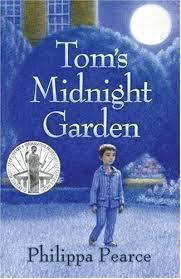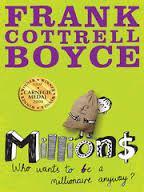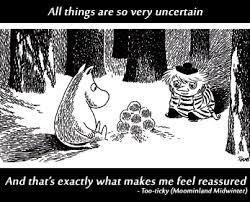 Going to lectures by childrens’ authors is not something I normally do, but I have a good friend with an eagle eye for these events, who is writing children’s fiction herself, and then the speaker was Frank Cottrell Boyce (henceforth FCB) whose books Millions and Framed were favourites of my son. The lecture is an annual event held in memory of Phillipa Pearce, who wrote Tom’s Midnight Garden. At the book buying/signing shindig afterwards, I felt pretty sure I had never read that book and so – naturally in the interests of supporting the event – bought a copy. Though Mr Litlove wasn’t impressed: ‘It’s got ‘worthy’ written all over it,’ he said.
Going to lectures by childrens’ authors is not something I normally do, but I have a good friend with an eagle eye for these events, who is writing children’s fiction herself, and then the speaker was Frank Cottrell Boyce (henceforth FCB) whose books Millions and Framed were favourites of my son. The lecture is an annual event held in memory of Phillipa Pearce, who wrote Tom’s Midnight Garden. At the book buying/signing shindig afterwards, I felt pretty sure I had never read that book and so – naturally in the interests of supporting the event – bought a copy. Though Mr Litlove wasn’t impressed: ‘It’s got ‘worthy’ written all over it,’ he said.
The lecture was, by contrast, all about the intense pleasure of reading and FCB made some rather good points. As well as being a prolific screenwriter and children’s book author, he is also involved in an organisation (and dammit I missed the name and can’t track it down in my internet searches) that promotes reading aloud to people in dire situations – children with extreme special needs, prisons, drug rehab centres, that sort of thing. FCB believes that being read to is a magical situation, that listening to a story, you are both highly alert and yet entirely without anxiety. If you know nothing is being asked of you other than your attention, you fall into a state of keen and agile acceptance that can have powerful consequences. Several of the anecdotes he told us concerned reports back from readers who witnessed attention deficit kids sitting still for fifteen, twenty, thirty minutes when engrossed in a story, and of prisoners experiencing an entirely different way of thinking.

His grandfather had been born with a caul over his head, which was supposed to indicate good luck, and indeed, he’d been an extraordinarily lucky man. He’d spent his life as a merchant seaman and had survived the battle of Jutland and the Second World War. The one night he’d got drunk and missed his boat, it had hit an offshore mine and gone down with all 700 hands lost. And then, it seemed that his luck ran out on the day that he died. He’d been a stoker, feeding the furnaces, and in the late 50s, when his boat was in Cardigan Bay, it happened to hit a mine leftover from the war. The mine exploded against the boiler room and his grandfather was the only man to lose his life. He shouldn’t even have been there but he was covering the shift for a friend.

But then he drew them all together in an intriguing image. He told us about the formation of coal, how algae soaked up billions of summers on an empty planet, sinking down into the earth until the heat of the sunshine was compressed and compacted into rock solid matter. And then a hole was opened up and the coal extracted, where it burnt with the energy retained from those billions of unseen sunny days. And he said that stories worked this way in the mind. That they took their energy and brilliance down into the mind and lay there for a long time, decades, perhaps, until suddenly, a shaft opened up and that story came back, its splintered images emerging unpredictably but just when you needed them.
FCB said he worried that the way stories are taught in schools, particularly with young children, destroyed their power. He said he often went to read in schools and he’d be introduced by the teacher and the kids would be really happy at the prospect of listening to a story. ‘And we’re going to listen out for when Mr FCB uses his ‘wow’ words,’ the teacher would go on to say, ‘and afterwards you’re going to write them down and make some sentences from them…’ At which point, FCB argued, the power of the storytelling was lost. If you turn listening to a story into a transaction, you rob it of its value. All the energy of the story is dissipated. Not least because the pleasure was spoiled, and pleasure he argued, is a profound form of attention, one with alchemical properties.
I thought that was extremely interesting. The talk also reminded me how much I missed reading to a child. I loved bedtime reading. It felt like a rare time in the day when my son and I were both doing exactly what we wanted to be doing. During questions, FCB was asked about his favorite books as a child and he said he couldn’t distinguish now between the ones he liked and the ones he’d enjoyed reading to his own kids. But he did single out the Moomins, particularly Moominland Midwinter, when Moomintroll wakes up while all his family are hibernating. It was, he said, like someone had asked Kierkegaard round on a play date. A line I have savoured ever since. If Tom’s Midnight Garden turns out to be too worthy, I might remind myself what the Moomins were all about instead.

